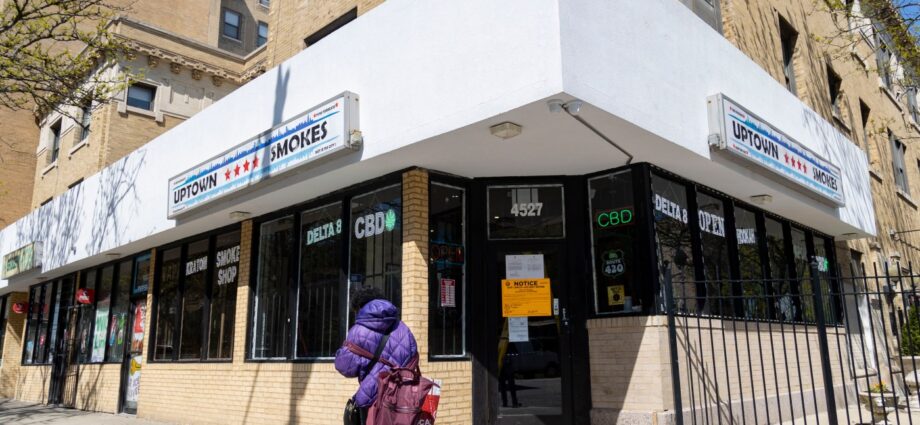Uptown Smokes on Chicago’s North Side is a spacious and friendly place to shop, with colorful, inviting packages lining its shelves — and that’s part of the problem.
Unlike licensed dispensaries that follow rigorous regulations in doling out marijuana-based products to adults only, Uptown Smokes is among a slew of vape shops, convenience stores, gas stations, lounges and bars selling largely unregulated hemp-based products that also get people high.
These hemp concoctions sidestep the marijuana rules intended to guarantee purity, prevent sales to minors and raise extra tax revenues. Instead, they take advantage of a loophole that has allowed unlicensed hemp outlets to proliferate — and earn big profits — at the expense of the licensed marijuana biz.
They’ve also been accused, plausibly, of marketing to children and understating the potency of the drugs their products contain. Sometimes heavy metals or even fentanyl, a dangerous synthetic opioid, have found their way into hemp products, which are usually cheaper and more widely available than marijuana counterparts that can only be sold legally through licensed outlets.
This is not a new problem, but solving it is proving more difficult than it should be. As craft brewers, neighborhood smoke shops and others pull in big bucks from hemp, their political influence grows. They are funding — ahem — a grassroots campaign to keep the hemp loophole open, and, so far, lawmakers at both the national and state level have dragged their feet in closing it.
As this page has said previously, the state must assert regulatory control over any outlet selling hemp intoxicants, to address the threat these unregulated products pose. That’s an especially urgent matter in hemp-saturated states such as Illinois. And the more we learn about the potential for public health and law enforcement problems, the more sympathetic we are to putting the hemp profiteers out of business entirely.
Hemp is a variety of the same cannabis plant as marijuana, but it contains only a tiny amount of psychoactive ingredients. It was a small-scale cash crop for Midwest farmers until 2018, when the federal Farm Bill removed hemp and its derivatives from the Controlled Substances Act.
The idea was to provide an opportunity for farmers to grow more hemp for paper, rope, clothing and CBD, a hemp product with purported health benefits that doesn’t get people high. Instead, crafty chemists started synthesizing hemp’s psychoactive ingredients, concentrating them into vape cartridges, gummies, dabs and other products that look and feel much like their marijuana equivalents.
With the 2018 Farm Bill, Congress carelessly opened the door to nationwide distribution of these products, undermining state laws that regulate marijuana. One of the biggest facilities for making and distributing bulk hemp extracts is in Indiana, for instance, where recreational and even medicinal pot is still prohibited. Indiana may drop the marijuana prohibition next year. Hoosier hemp, however, is already widely available.
You’d think Congress would have owned up to its mistake by now, but so far nothing has been done. When the 2018 Farm Bill expired in 2023, the blue-vs-red warriors on Capitol Hill couldn’t agree on a new one, and instead extended the old one, loophole included. It’s possible a fix could get tucked into a post-election spending bill or, less likely, a new Farm Bill could be approved, but don’t count on either step.
Illinois tried to take the initiative with a measure that passed the Illinois Senate overwhelmingly earlier this year, then stalled amid opposition from craft brewers and other hemp beneficiaries. The bill would have imposed a two-year ban on selling hemp products, then followed up with new rules and taxes.
The hemp people say they would welcome the regulations but strongly oppose any ban, which they say, correctly, would hurt their businesses, cost jobs and stigmatize harmless CBD products. Meantime, they continue to take advantage of the loophole.
That leaves some public officials frustrated, including Chicago 2nd Ward Ald. Brian Hopkins and 3rd District Cook County Commissioner Bill Lowry. The two local politicians, accompanied by health and legal experts, met with us and compellingly made their case. Hopkins is pushing for municipal regulations and Lowry for a resolution to ban hemp products. Both concede those steps are unlikely to have much of an impact compared with state or federal action, but we credit them for stepping up to do something instead of the nothing done so far.
Hopkins and Lowry represent the part of Chicago where Lurie Children’s Hospital is a magnet for kids with medical emergencies. They shared alarming stories about children ingesting large amounts of hemp, often in the form of candy, and needing law enforcement and emergency room intervention.
Uptown Smokes is not far from Uplift Community High School. Last year, five high schoolers had to be transported to hospitals after consuming gummies that, as the Tribune reported, came from the store. Hopkins says the only action available to him was shutting down the building temporarily for code violations that were swiftly corrected, enabling it to open again.

Brian Cassella / Chicago Tribune
Uptown Smokes at 4527 N. Sheridan Road was closed for building violations, May 4, 2023. (Brian Cassella/Chicago Tribune)
There’s no question some adults enjoy these products and want them to remain available. As Chicago’s history shows all too well, Prohibition doesn’t work.
It’s also clear that there’s an intensifying industry battle between legal pot purveyors and the hemp sellers, and policymakers are being asked to take sides. We’re not generally advocates for governments picking economic winners and losers.
But if the hemp entrepreneurs and federal lawmakers won’t act to solve the problems they’re causing, then our sympathies are with Hopkins when he tells us, “We need to put these people out of business.” The hemp purveyors aren’t likely to get serious about regulating their business if they’re allowed to carry on as usual as discussions proceed.
Submit a letter, of no more than 400 words, to the editor here or email letters@chicagotribune.com.

